#noldor crafts
Explore tagged Tumblr posts
Text
My Headcanon Crafts for the House of Feanor:
Nerdanel: a sculptor; about the best in all of Valinor. Many of her early sculptures were praised, but also seen as a bit strange because they looked so real, but no one could identify any model they'd been based off of. Later, it would be recognized that she'd sculpted several of her own children, long before they were born.
Maedhros: an actor. Back in Valinor, he often played romantic leads in comedies and tragedies alike. He was very dramatic back in the years of trees, but got more subdued in Middle-Earth for... obvious reasons. A few of the posters for plays he was in made their way to Middle-Earth and got passed around Himring like contraband.
Maglor: a bard. While he often composed his own songs, he was also one of those charged with memorizing the old oral history of the Quendi– the elven equivalent of like, being able to memorize and recite the Iliad. Much of this early Elvish history was almost lost by the end of the First Age, and Maglor attempted to preserve it by writing it down. Eventually, those books ended up saved in Rivendell's library.
Celegorm: a hunter in Orome's train. Was famous for his ability to hit quickly moving targets through the thick forests of Valinor, even when mounted. He also enjoyed making various things out of the pelts, teeth, claws, and antlers of his kills. He's made very nice fur coats for several of his siblings and cousins.
Caranthir: a fiber artist; mostly focusing on weaving and embroidery. He's not sure whether to feel flattered or vaguely worried by all the Miriel comparisons. He insisted on making most of his family's formal clothing because all of Feanor's kids can get at least a little craft-related hubris. As a treat.
Curufin: a smith. His father was most famous for his jewelry, but Curufin would come to be known mostly for his weapons. They were so reliable that many of them lasted until the Third Age. There are rumors he poured some of his soul into the weapons he made for his brothers. But those are only rumors.
Amras & Amrod: painters. They specialized in incredibly detailed landscape paintings. I say "they" because all their works were done together; Amrod would make the sketch and darker linework and Amras would add the colors and shading. Their work was often very nostalgic and peaceful, with bright watercolors and gentle shadows.
Bonus! Feanor saved a lot of his kids' work from when they were really young and just starting their crafts. It's all what you'd expect from a small child's art, but Feanor still acts like they're masterpieces. His kids all think it's super embarrassing but he's really proud of them.
Headcanons for Finwe and his Children, the House of Fingolfin, the House of Finarfin, and the rest of the House of Finwe. Thanks for asking about Finwe's grandkids @hyperlexia-1 :)
#silmarillion#silm headcanons#house of finwe#house of feanor#noldor#noldor crafts#feanor#nerdanel#maedhros#maglor#celegorm#caranthir#curufin#ambarussa#good dad feanor
364 notes
·
View notes
Text
Happy New year, my friends!!!
I've made this little version of golden tree of Valinor - Laurelin. And also finished Finrod's portrait with my new pencils Caran d'ache Luminance.
Of course I remember of 3th january. Thank you for all. You know, I've always remember this date. I'm not yet to finished my new sketch. Hope, I will doing it this day at last.
"But there is another which is founded deeper. Estel we call it, that is "trust"...
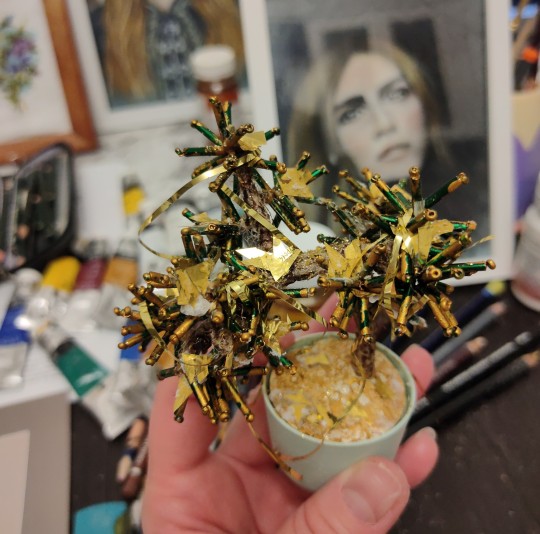
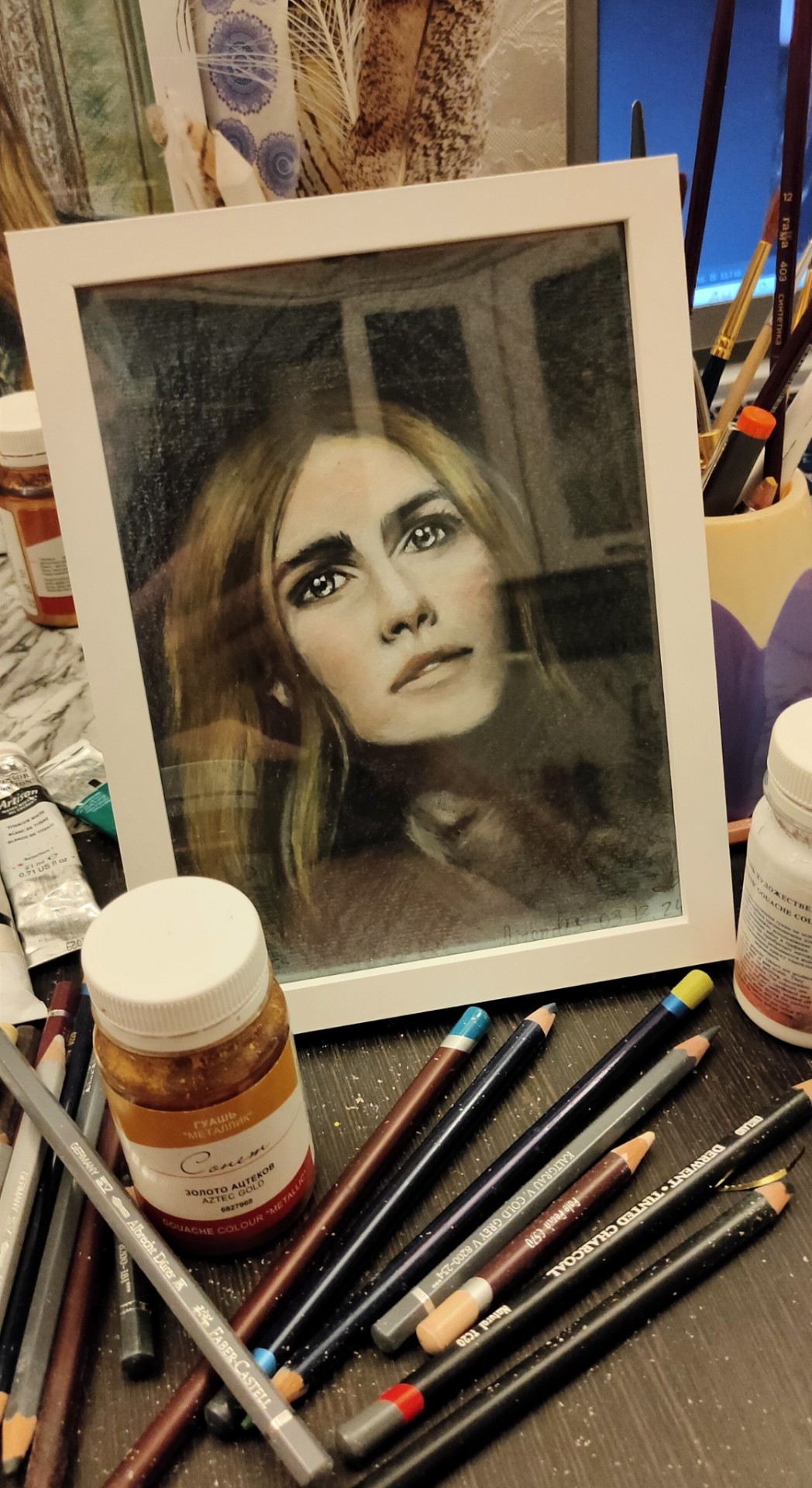
14 notes
·
View notes
Text
Silm fandom is a very dangerous place for someone with world builders disease.
#one minute you’re thinking about family squabbles#the next you’re thinking about how agricultural differences im beleriand impacted noldorin craft during the exile#or making elaborate charts of quenya and sindarin in order to name your OCs#silmarillion#tolkien#feanor#was a tradesman#that tells us so much about noldor nobility!#thingol sure as hell wasn’t working the forges#down to the third age galadriel is making her own lembas#nerdanel was a strange match not because of low birth but becsuse she wasn’t beautiful#what does this social structure look like??
24 notes
·
View notes
Text
Oh wow I was not expecting this from the pajamas post xD. But I love learning new things! I'm not a language nerd so I don't know much about other languages except for German.
I just know the practical stuff around sewing, Weaving and embroidery. One of my favorite things is how lace is made in the past.
I know a elderly lady who still does needle lacing and bobbin lace. (She also knits pullovers for me) It is a very beautiful craft and especially the bobbin lace,skilled women can make whole pictures with that. I don't have pics of her stuff but here are some pictures from a museum and so on :)
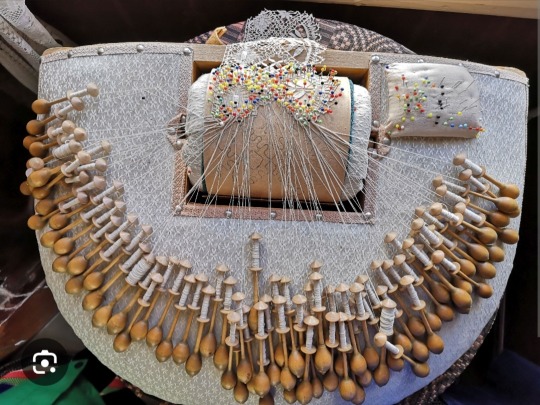
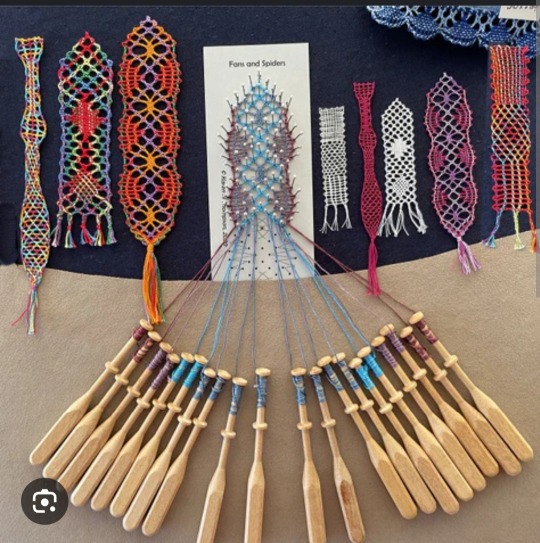
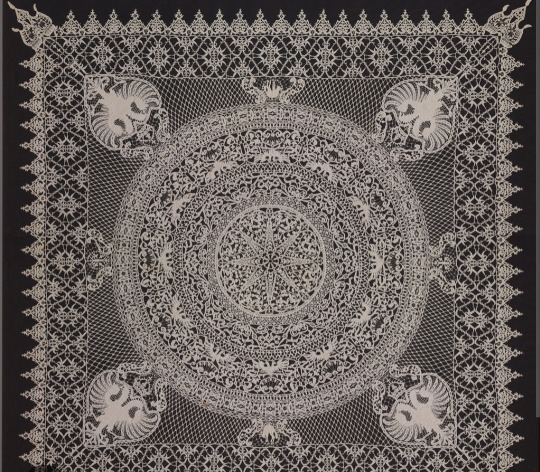
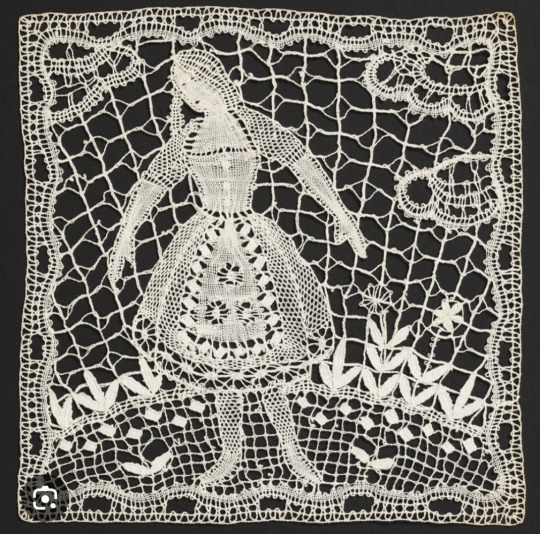
Bobbin lacing is also very fun to watch as you move the wooden part from one side to the other and so on. And you need so many pins.
Nothing for me I get mad when the treads tangle up
It is a craft that is dying out :(
As for the Tolkiens world.
Lace work is something that I always thought the elves would love to do!!
Think gold laces!!!
On another note do you know about the "viking knit"
That's a modern art of making knitted jewelry like armbands and so on.
The older term is "Trichinopoly" what a mouthful
But I strongly Hc that especially the noldor women are skilled at that!!
Here are some examples I swear they look better in rl
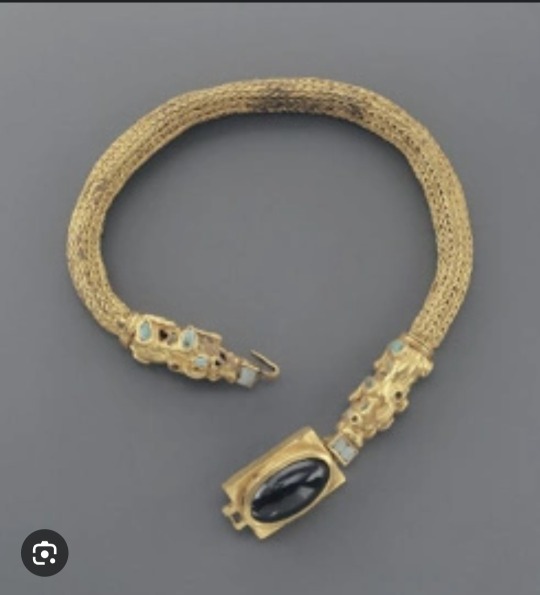
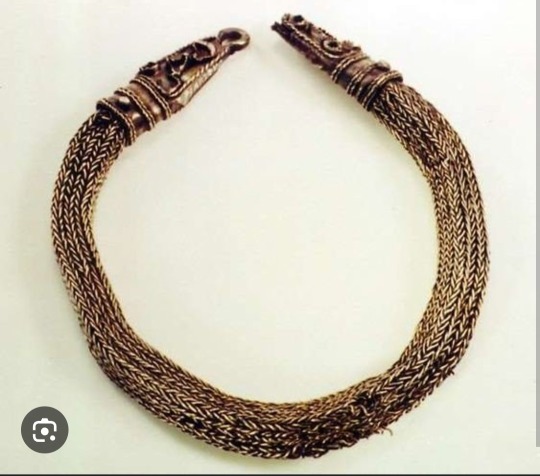
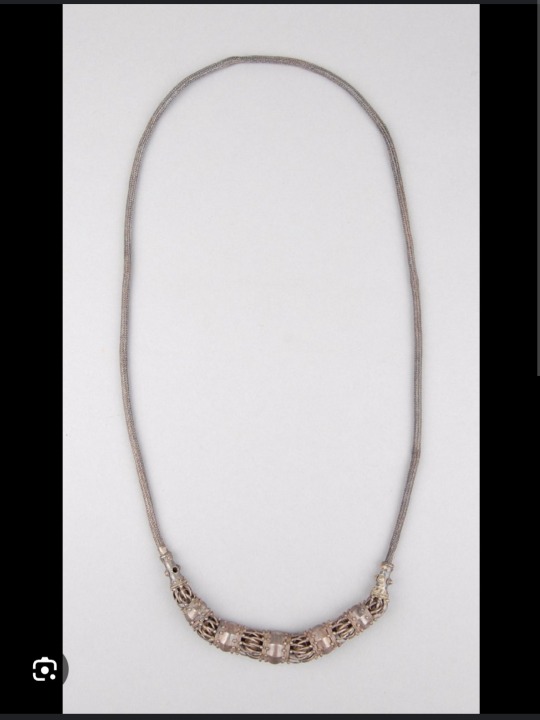
For reasons related to Miriel Þerinde, Vaire,
and the Norns (and maybe Ungoliant and/or Lúthien),
feel free to infodump me, if you will, with fun facts about historical textile arts, history of weaving and sewing, also your HCs about how those things look like in Aman (at any point of history). (You can assume some knowledge on my part of the related crafts, not necessary of history.)
Thank you!
#tolkien#silmarillion#noldor#art and craft#bobbin lacing is so beautiful#i tried viking knit once but i dont like the metallic smell of it#but it is fun to form the bands and you can twist them and add big beads to them!
24 notes
·
View notes
Text
Thingol, Luthien, and Dior’s claim to the silmaril bugs the living daylights outta me and I’m gonna break down why. This goes a bit beyond ownership laws.
Starting with basics. What are the silmarils? Gems created by Fëanor that hold the light of the Two Trees. Who in Beleriand saw the light of the trees and no doubt misses it like a limb? Are here in part to avenge their destruction? The Noldor.
The Sindar never went to Valinor. They might find the gems beautiful but that’s it. There’s no cultural or emotional connection to them beyond ‘pretty stone, look how awesome our princess was.’ There’s no appreciation for what they hold. No understanding that this stone is one of the *last* things that holds the ancient light of the Trees.
The Noldor meanwhile not only saw the Light, they had entire festivals surrounding it. Grew their entire culture, their lives, under and around it. Now the trees are destroyed, their king killed defending these jewels. And this last beacon of hope, a piece of the home they can never return to, a piece of light that will never come back, is being kept by people who can’t even begin to understand the significance of what they keep.
Now imagine being the sons of the one who made this jewel from a culture of people who value craft above all else.
Not only is it light, it’s the result of years of toil and experimentation of your father, the one who managed to do what no one had ever even thought of. Fëanor’s sons would have been the first to see these jewels, probably saw him make prototypes, work equations whilst they worked on their own crafts. Provided what relief they could to his ever working mind and inadvertently gave him ideas that helped solve problems he encountered along the way. Suddenly it’s not only a key part of their culture, it’s something core to their family.
Then Fëanor is killed and in many ways it’s the most important thing they have left of their father. Now it’s a source of memory too, for someone doomed to the Halls for eternity. Who they’ll likely never see again unless they’re killed.
Now from what I’ve heard, Tolkien says the Fëanorions lost their right to the Silmarils when they killed for them. Which makes no sense considering the Silmarils were *created* by Fëanor. Yes the light was created by the Valar, but what, you’re gonna say ‘I created electricity so that lightbulb you made is actually mine.’ That’s not how it works. Fëanor made the casing for the stones and figured out how to hold the light, without aid from the Valar. It doesn’t matter what actions they take, the right to the Silmarils remain theirs and theirs alone. The jewels hold no power of their own, they’re literally objects. Healing objects at most. Morals do not dictate their ownership, hallowed or not.
Tolkien going on to say the right of Doriath’s Silmaril actually goes to Beren and Luthien for taking it from Morgoth gives me frankly coloniser vibes.
‘Oh this thing I stole was originally stolen from you? Too bad. I took it so it’s mine now. Don’t care how important it is to you, your entire culture, and your people.’
Get where I’m coming from?
All in all the whole situation gives me Bad Vibes and I really don’t like the attitude the Sindar have to the Silmaril. In terms of Elwing, I can partly forgive her purely based on trauma response. Fine. Doesn’t make it right, but I understand. But that never would’ve been a problem if her father, grandmother, or great grandfather had the sense to acknowledge the silmaril was never theirs to keep. Don’t like the Fëanorions, (too bad) at least give it back to the Noldor.
#silmarils#Fëanor#sons of feanor#house of feanor#Maedhros#Maglor#Celegorm#Caranthir#Curufin#Amrod#Amras#Ambarussa#Morgoth#Finwë#Sindar#Noldor#valinor#beleriand#silmarillion#tolkien#silm#silm headcanons#feanorians#tolkien elves#silm analysis#silm meta#on Noldor culture#and silmaril rights
705 notes
·
View notes
Text
JayVik X Silmarillion au
Okay, so i have no idea how many people will follow my train of thought on this one but here we go!!
(it’s silmarillion canon-compliant if you squint really hard, also, Viktor said in all timelines, in all possibilities, so this one is on him too ig)

- Jayce was born in F.A. 438 in Hithlum
- His mother came from the Haladin, while his father followed the descendants of Marach and lived in Dor-lómin under the House of Hador
- Jayce’s father was a skilled craftsman, this granted him respect and favour from both the Noldor who lived in Hithlum and the Men of the House of Hador alike
- Like his father, Jayce excelled in various crafts, the most prominent one being blacksmithing

- Although Viktor’s parents were Nandor from Ossiriand, at some point they wandered and settled in Nan-tathren
- Growing up in the desolate meadows of Nan-tathren led to Viktor developing a strong connection with and great knowledge of living things, herbs and trees, and animals, even enchantments. While living near the waters of Sirion, he sometimes heard the voice of Ulmo, which often helped and guided him
- Viktor is a talented healer who uses both his knowledge of nature and Songs of power
- Through one of his dreams, Ulmo told Viktor to head north, as his aid as a healer would be needed to save the new hope that shall come from the House of Hador

- Jayce and Viktor first met in F.A. 458, ans despite the odds, immediately took a liking to each other
- Jayce was the craftsman who created Viktor’s brace, which he had to wear after a severe leg injury, that couldn’t be fully healed, even with Viktor’s and other physician’s skills and knowledge
- Sorry to tell you that, but Nirnaeth Arnoediad still takes place in this au, so Jayce is wounded in the battle and takes his final breath in Viktor’s arms while the latter tries his best to keep him alive but fails
- The new hope, the person Viktor’s supposed to save, is still Tuor. Viktor is the one elves who help Rían after the battle, but when the child is born, Viktor decides to follow Jayce
#silmarillion#arcane#jayvik#jayvik x silmarillion#viktor arcane#jayce arcane#idk guys maybe i’ll draw more of this au cause in my mind they were not slow here#so technically they had 14 years together and spent it as happy as possible in their circumstances#art#fanart#tolkien#ilaneya
139 notes
·
View notes
Text
Lauriel
When Lauriel is growing up, she knows her older sister is a better singer than her. This is not because she's heard her sister singing all that much; her sister is fully grown and moved halfway across Aman before Lauriel is even thought of. But it is a thing people tell her of, a little awkwardly, a little gently, whenever she mentions her ambition to be a bard. Her sister is a better singer than her, and her sister is a potter. Ergo . . .
Lauriel takes up the flute. Her sister did not play the flute as a child and her rare letters don't mention it now; her sister cannot be better than her at the flute.
Her mother tells her flatly that this does not mean her sister wouldn't have been better at it, had she ever tried.
"It takes a lot of dedication to your craft to be a bard," her father says, a little more gently. "It's a very competitive field."
Left unsaid, but very much heard, is that Lauriel, of course, is far too flighty to have that sort of dedication.
It is not the first time they have had this conversation.
It is the last, because Lauriel vows to all the Valar that she won't set foot on the farm again until she's the greatest bard the Noldor have ever seen.
It does not take her long at the university in Alqualonde to learn that she is almost certainly never going to be so much as one of the best ten bards the Noldor have ever seen. This does not, however, stop people from still enjoying her music - or, for that matter, from enjoying her dancing, her conversation, her skill at the competitions that are all the rage at parties, and so she never lacks invitations to just about any event in town.
She's friends with everyone, and she hasn't written a single letter back to the farm, and she tells herself she doesn't care that none have come from there for her.
She doesn't talk to any of her friends about that.
She does talk to the woman with the tense, tight shoulders at the current party, swooping in to rescue her from the circle of jabbing fools around her; she's not sure why the other woman needs rescuing from the discussion of the night's musical entertainment, but it doesn't matter; she doesn't need to understand to recruit her to make up the numbers at Lauriel's table for cards.
Aranel is laughing when Prince Makalaure, of all people, comes by their table, which is how Lauriel learns that the woman she rescued is Prince Makalaure's wife.
He sees her flute in its case beside her and asks to hear her play.
He compliments her when she's done. Invites her to another party the next week.
Lauriel, of course, says yes.
She's never political. She's never really bothered about any of it.
But she starts to fall into his circle; their music is so passionate, so innovative, and she likes the way they circle around each other. They're dedicated to each other in a way the endless sea of her other friends aren't.
So when she hears someone being rude about his father, of course she speaks up; for all she knows Prince Feanaro is crazy, but that doesn't give anyone the right to be cruel about it.
She gets offered a job at the university in Tirion, and she thinks Makalaure recommended her for it; she finds out later he praised her skill with people as well as her music when asked for his opinion on the posting.
She finds other people start assuming she's political, even though she still doesn't much care whether they're allowed to sail back to Beleriand or not. She does care, though, about people being rude to her friends, and apparently that is political now, so political she is.
One of her friends is shocked that she's gone this long without hearing Prince Feanaro speak, so even though she still doesn't really care, she laughs and lets them drag her along to his next one.
She gets it now.
Why half of Tirion follows him and why half of Tirion thinks he's crazy.
She still doesn't really care. Even after the Incident - well, that was wrong, of course, but she doesn't see why people have to be rude to Makalaure and Aranel about it.
When the darkness comes, she goes with Feanaro's camp, of course. Almost all of Makalaure's circle does.
Partially because at least Prince Feanaro has a plan. Partially because everyone else is doing it.
Mostly because she hears Makalaure swear the Oath, and -
And her oath is not so burdensome a thing. She cannot go back to the farm; she has accepted she will never be able to go back to the farm. But she could still see her parents if they would come to her, if they would meet her elsewhere, if either she or they would ever just send a letter.
She feels it, though. Always, she feels it.
She wishes she had told him. She hadn't, ever; she hadn't known how to look at the actual greatest bard the Noldor have ever produced and admit to her adolescent ambition. But if she had swallowed her pride and told him - if he'd been warned -
She follows him.
(It is four ages later that she tells him at last; when he asks her, as they prepare to sail with Elrond, what she thinks of at last returning home.
"Oh, home's not really a place," she says in surprise. Home has been people for the past four ages of the world, and she has no intention of leaving those people now. "I suppose I'll have to wait and see if my parents choose to visit; I can't go to them unless they've moved."
This catches his attention. "Whyever not?"
"Well," she says, studiously not looking at him. "I swore an oath.")
(It is midnight when Elrond finds a furious Maglor correcting a beleaguered Lauriel's pitch in the garden.
"Are you planning on making our plea to the Valar for your brothers in the form of a concert?" he asks in bemusement. There is precedent, he supposes, with Luthien, but he would have thought Lauriel would have had more patience with the fevered practice if it were the case.
"It is no true teacher who cannot guide a student to surpassing himself," Maglor says grimly. "And it is no true prince who does not return loyalty. Lauriel will be the greatest bard the Noldor have ever produced."
"I don't want to be," she says in some desperation. "I really don't. I don't care if I can't go back to the farm."
"You should have the option," Maglor says firmly. "Now try again.")
#lauriel#maglor#tolkien ocs#silmarillion#makalure went to alqualonde to help stir up political sentiment for his father#he didn't know he was going to get his right hand woman out of it#aranel and lauriel are friends#lauriel would really much rather focus on getting aranel back then on her own family situation thank you very much
277 notes
·
View notes
Note
Balls you know that rumor that Tolkien tried writing something explicit but he thought it was so bad he locked it away and Tolkien Estate is trying to pretend it doesn’t exist?? Who do you think the couple that got official Tolkien smut could’ve been
Thank you for this enlightening question.
My first thought was either Celedriel or Celrond, for the greatest self-insert potential, considering they’re both Very Married Couples. Or if we’re going by his own self-professed self-insert, potentially Beren and Lúthien. Aragorn and Arwen is another possibility, but even in the Appendix story, Elrond is a bit of a third wheel/gooseberry in this context, so it would have been a bit too much like having the Eye of Sauron on your ass.
Now, if the Tolkien Estate is pretending it does not exist, that leads me to hope pray think that there’s some nasty fucking going on, or fucking that Tolkien himself must have considered nasty. Because the Estate doesn’t seem too opposed to sexual connotations in general, considering Arwen and Aragorn spent the entire original trilogy fucking through their clothes and the Hobbit films had Kili as somewhat of a Casanova figure, in the only film I remember from said trilogy. They may not have approved as such, but neither were they censored, as far as I remember.
My theory is this: it is not a sexual union as such being portrayed. It is, instead, an act of self love.
It is Fëanor, having a wank, ass out under Starlight.
Is this particularly nasty? No. But keep in mind this is the man who did, in fact, write LaCE. So I don’t think Galadriel and Thuringwethil are joining their pussies in union any time soon. So, my theory is that it’s Fëanor having a sad, angry wank alone in his studio. There may have been some hammer/other tool insertion going on.
This too, the Estate may have had an issue with. After all, and I don’t remember much about Fëanor’s hammer or the TV show’s portrayal of it, but I distinctly recall Charles Edwards’ fingers curling comfortably around it. It’s not necessarily a continuity error, but it certainly does make one wince in hindsight, thinking about where the hammer had been. Or even forgetting the show. Does it sit in Formenos still? Is it a museum exhibit? Or a trinket in a market stall? Or, Valar forbid, has it been turned into a public relic, much like a lucky-stone or wishing-well, that passerby touch to ensure good luck and skilful crafting? Has it been cleaned? Do the Noldor in Aman know about sterilisation? Do the Noldor in Aman know about sterilisation?
I digress. I feel like Fëanor touching himself would make perfect sense. He is, after all, a tortured artistic genius. Spending hours in his workshop, thanklessly working on his craft. In a way, the written word is like a Silmaril. Three Silmarils. Three LotR books. Perhaps dear Fëanor got a little kinky with it. Perhaps there was some ballbusting involved. Perhaps the hammer, or some other crafting tool, makes a reappearance in this regard. I am certain it was lovingly described, with a worrying degree of realism.
One day, I will find it.
93 notes
·
View notes
Text
Finwë, Míriel, Indis & Findis, Írimë





Sons of Fëanáro - Fëanáro, Nerdanel & Celebrimbor - Children of Ñolofinwë - Ñolofinwë, Anairë & Grandchildren - Children of Arafinwë - Arafinwë, Eärwen, & Grandchildren
HC:
Finwë: I like to headcanon Finwë as a cartographer, he was one of those wo worked on making maps when they traveled, and arrived, to Valinor. He keeps his hair free from jewelry in honour of the early days and for those who didn´t follow Oromë, a practised followed by Fëanor. While I like to image Fëanor being his favorite he still cared a lot for his other children, and always made room for those in his family, if that meant taking a small child and some dolls or building blocks with him to court, or going for a walk in the garden to talk or see a finished projects when he had work to do, or merely eating lunch together.
Míriel: I know a lot of the fandom shares the idea of Rúmil being her father, and I think that´s great because I love that headcanon too, for many reasons, but one of them being the closeness between Rúmil and Fëanor suddenly being a bit different and more meaningful in a way. Before coming to Valinor I imanged she mostly embroidered and weaved baskets, after being crowned she was always found with something in her hands, a small weave or embroidery, or on one of the bigger looms around the palace, she did have a whole room dedicated to her craft and I image she spent a lot of nights there as sleep came hard to her. Her best friend was Indis and they both babysat Ingwë when he was young and they got permission, which is where they meet Finwë on the great journey.
Indis: Vanya are taller than the other groups of Eldar due to being so near the Ainur, as I depict here, but Indis is general just tall which, even before Valinor which she makes a point of to show in her youth, especially with Míriel who I headcanon as on the shorter side. Míriel did try to teach her embroidery before but never had much succeed, although she did embroider most of Indis´ veils in the hopes of teaching from her by showing Indis. Most of the royal gardens are overseen by Indis who got a love for them after her wandering of Valinor where she sang, I also imanged that while everyone knew Maglor was gifted in song, Indis was the first one who really saw how great he would become in his song, just not bad he would become too. She was Finrod´s, who later learned from Maglor, first music teacher at the demand of Maglor and Fingon. After Fëanor's first rebellion, she left with Findis to join her brother, Ingwë, with the Vanyar and didn´t speak with Finwë before he died, where he claimed that his love for Míriel didn´t make him love Indis less*.
Findis: Findis was most closely related to her Vanya line, and after Finwë´s death, I imagine she was one of those who pleaded with Manwë for his release, a release we are never told was granted. This closeness to Manwë is also what I think made her reach for priestesshood. After the Noldor began returning she gave a lot to be able to shelter them as they returned to the life they had had before as much as was possible or tried to build a new one for themself. I also think being the oldest child of Indis meant a lot for her and might have been one of those things that pushed her closer to the Vanya and Valar, and her faith.
Lalwen: Lalwen served as chief adviser both for Maedhros for a very short time and then later for all the high kings to come after. Upon joining Círdan with Ereinion she quickly feel in love with him and while I don´t think they ever got married they might as well have been. She was the closets to Fëanor due to them being alike in their restlessness, which became both of their downfalls, as I headcanon she died in the start middle of the second age in a small battle simple because of her denial for everything being calm and war over. After all she had spent to many years in the middle of war, I don´t think she knew anymore how to live without it.
Other HC: my headcanon of Míriel and Indis friendship are taken from the part where Míriel was first named Indis and than later renamed Míriel so Indis could get a name too instead of being nameless. I also don´t image she "divorced" Finwë but Indis is said not to miss him after his death and that her love was most for Fingolfin, which I think was made in rebellion against Finwë´s own favoritism.
*this is canon and taken from the "Laws and Customs among the Eldar" I just think it gets overlooked a lot as I really like it myself.
#tolkien#silmarillion#jrr tolkien#finwe#finwë#miriel therinde#míriel þerindë#miriel#míriel#indis#indis of the vanyar#findis#lalwen#irime lalwen#irime#írimë#silm art#tolkien art#digital art#my art#finweans#house of finwe
86 notes
·
View notes
Text

On a summer evening in Rivendell, Elrond's little family are busy designing a sensory-play room for the twins. (If Elrond ends up hiding in there too after stressful councils, no one's going to say anything.)
For Day 5 of @elrondweek (a little late because of absent-mindedness...) Please click on it to see all the details!!
A lot of research went into this painting (and a lot of thought about how you'd crease a multisensory environment in a fantasy world with no electricity for pretty lights and bubble lamps) so here are some notes and headcanons:
Lighting: A number of elves who studied under Feanor later lived in Middle-earth (especially Eregion) and continued making crystal lamps and light-altering gemstones. The crystals in the small jar are a kind which glows for several hours after being “charged” with sunlight. They are used for decoration and in situations where a flame would be impractical or dangerous, e.g. a child-safe nightlight.
Light projection jars: Glass jars decorated with colours and patterns. When a light crystal is placed in the jar, the colours are projected across the floor or wall. (Elladan and Elrohir are still a little young to be trusted with heavy glass jars, so for now these will be kept in a locked chest and used with adult supervision).
Fabrics: Samples of cloth with lots of interesting colours and textures for the kids to choose from. Some (like the star cloth Elrohir is admiring) will be draped from the walls or ceiling of the sensory room to create a dark, cosy environment, and others made into blankets, cushions, etc.
Star cloth: Cloth embroidered with tiny, faintly-glowing gems, resembling the night sky. First created in Valinor by a member of the textiles guild, it was popular among older elves who wanted to remember the skies of Middle-earth. It was expensive and difficult to make, and fell out of fashion when the Noldor left Valinor. The craft was revived in second-age Eregion, and easier methods of making it were developed.
Toys: Elladan is playing with a painted wooden rain-shaker. Other sensory toys pictured include a colourful spinning top and a set of tactile wooden balls. They’re gathering a collection to keep in the boys’ toy-chest. Elrohir prefers the tactile objects, while Elladan likes any toy that makes a noise.
Room decor: Inspired by Art Nouveau aesthetics. The rug is based on an antique Donegal carpet, and the wallpaper on Arts and Crafts designs.
Clothing: Inspired by paintings and antique garments: the twins and Celebrian are (loosely) based on paintings by John Singer Sargent and Henry Arnould Olivier, while Elrond’s robes are based on a 1905 House of Worth tea gown.
There are a number of flowers and plants in this painting; their meanings in flower language are as such:
Bonsai pear tree: comfort
Irises (in the stained-glass window): wisdom
A vase of white lilacs: joy of youth, youthful innocence
Traveller’s joy (in the patterned wallpaper): safety
Primroses (Elladan’s hairpin and the embroidery on the twins’ dresses): early youth
Daisies (Elrohir’s shoes): innocence
Forget-me-nots (Celebrian’s dress): true love
Lily-of-the-valley (Elrond’s hairpin): sweetness, return of happiness
#this might be the most detailed thing i've ever drawn#it took almost 60 hours#also the most self-indulgent (although i still need to work out how elves could have bubble lamps)#elrond and elrohir are both autistic btw#elrond week#elrondweek#elrond#celebrian#elladan#elrohir#rivendell#tolkien art#lotr art#tolkien fanart
209 notes
·
View notes
Text
My Headcanon Crafts for Finwe and his Children
Finwe: a woodcarver, he likes really intricate geometric patterns. Carved most of the furniture in his house. Occasionally experiments with larger statue work. One of his favorites is a large bear; which he made for Orome's halls. He also carved cribs for each of his kids.
Feanor: a smith. One of the things that makes him special is that he's one of a few elvish smiths who can actually make gemstones. For all that later generations will remember him for his swords and Silmarils, most of his work was in fine jewelry and more modest Feanorian gemstone lamps.
Findis: a writer, and a very good one, but most of her work remains unpublished. She can be just as possessive of her secrets as Feanor, and for elves, words absolutely have power. There's a mountain of paper in her home, and she doesn't really know what to do with it.
Fingolfin: a glass worker, who specializes in stained-glass windows. The things he creates are beautiful, especially with the light filtering through them, but they're also fragile. Some of his favorite works are Feanorian lamp gemstones he surrounded with a mosaic of colored glass. (They're some of Feanor's favorites too, but both of them would rather die than admit it)
Lalwen: a cartographer. She traveled almost every inch of Beleriand, and her maps are still some of the best remnants of the sunken continent in the Third Age. Always drew sea monsters on her maps as a matter of principle.
Finarfin: a baker. It's very nontraditional for a Noldor craft– it's more typical of the Vanyar, but he insists that food can be art as much as anything else. He measures everything out by feel, and it tastes great every time. His kids all have fond memories of baking crepes with him.
Headcanon Crafts for the House of Feanor, the House of Fingolfin, the House of Finarfin, and the rest of the House of Finwe.
#silmarillion#house of finwe#noldor#noldor crafts#finwe#feanor#findis#fingolfin#lalwen#finarfin#silm headcanons#let me know if you want me to make a similar post for Finwe's grandkids
176 notes
·
View notes
Text
In the early ages of Valinor there was a festival celebrated by the Noldor. It was very secretive and secluded ceremony so that not many outsiders knew a lot about it.
It was called the starlight festival, a ceremony in celebration of their first guides. The stars.
The first elves were born underneath starlight and lived under it for many years, the stars were their guiding light for long, before they came to Valinor.
The tradition was started by Queen Míriel, who loved the stars most of all her people, for her own hair shone like them and made her feel a special connection to the lights in the night sky.
Traditionally the Noldor wore pure white gowns with detailed silver embroidery which where very light and easy to move in to make it easier to the dance.
The embroidery was personalized for every single elf, making every piece uniquely fitted and decorated to represent said elf.
It showed whatever represented them most and was often connected to their craft.
A mariner or fisher would wear some type of waves, a weaver string and needle, a smith, depending on his specialty, gems, jewelry or whatnot. Those who took to other physical labor would often wear their tools, modeled after the real thing.
Additional to the white robes a flower crown made of pure white flowers was worn atop the head or, if someone wished, braided into the hair.
The flowers used to make them were unique and shone like the light of the stars themselves. Of great beauty and with soft, silky petals. They came in all sizes so it wasn’t uncommon for someone to have dainty small ones and another large ones that came down into their face.
The festival happened under the first clear night of the year, all light would be put out so the stars could be seen particularly well and the Noldor would dance beneath the sky that first welcomed them into the world.
After Queen Míriel died the tradition was largely abandoned due to King Finwë being unable to handle the grief of being reminded of his late wife.
Years later during Fëanor‘s exile to Formenos he brought the starlight festival back to life, teaching his son‘s and wife the traditional dances, helping them design their robes and make their flower crowns.
After the flight of the Noldor the tradition was lost a second time. Thought the son‘s of Fëanor carried on with it the war made it as good as impossible.
As battle and bloodshed slowly took over Beleriand they took to making flower crowns out of paper if they could or had the time for it, if not they simply thought of it, remembering the peace and quiet of the near sacred night their people used to celebrate and longed for the flowing robes and soft crowns.
When Elrond and Elros were kidnapped from Sirion Maedhros made an effort of making sure they knew of this tradition, in fear that if Maglor and he died no one would remember it any longer, and their grandmother’s legacy would fade.
After Maedhros died and Maglor disappeared the world seemed to have forgotten about the starlight festival, the great joy of Queen Míriel of the Noldor, who‘s hair shone like the light of the sky and who loved the nightly glow above all others.
But if you visited Lindon in the second age, and were around at the right time, looking out your window at the correct moment, you might saw a figure, dancing on the rooftops of the elves city, dressed in white, with flowers atop their head and gaze turned towards the stars.
#the silmarillion#silmarillion#silm#silmarillion headcanon#lord of the rings#lotr#lotr headcanons#headcanon#noldor#miriel therinde#valinor#formenos#starlight festival#fëanor#sons of feanor#beleriand#amon ereb#kidnap fam#maedhros#maglor#elrond peredhel#elrond#elros tar minyatur#elros#lindon#feanorians#tolkien#fëanorians
213 notes
·
View notes
Text
Not going to lie, I find it weird and off-putting when people characterize Feanor (& sons) desire to reclaim the silmarils as 'greed'. Like.
Is it greedy to want your own shit back? Like is it outrageous to try to reclaim your own property that has been stolen AT MINIMUM once, and in one case twice, and in the ultimate end stolen and then subsequently taken as war booty by a neglegent if not outright hostile force? Is 'greed' the word you really want to use? Is that a word you would use you you translated the situation into something of your own? If someone stole your bike, or your wallet, or a piece of art that you made, and you expected it to be returned to you... would you want to be called 'greedy' for that?
idk there's just something weird about wanting to reclaim objects that are both a) important representations of calaquendi noldor culture and craft and b) a literal embodiment of the divine light that recalls better being described as excessive and unreasonable that rubs me the wrong way.
Just to be clear: I am not endorsing acts of violence to meet the above goals! But 'greed' does not denote excessive force or unjust means! It denotes unjust desire. Characterizing Feanor's drive to reclaim the silmarils as greed means that the desire itself is unjustifiable or unreasonable.
#tolkien#san shoots the breeze#And it also implies that if the writer/speaker were in feanora shoes that they would feel differently#And let's be honest: I call 10000% bullshit on that implicit moral superiority#You may lack the physical courage (or have too much moral restraint) to back your desires up with violence#But your desire to reclaim your shit would be fully present.
260 notes
·
View notes
Text
Angrod and Aegnor Headcanons
↳ for @arafinwean-week Day 3: Angrod and Aegnor
Angrod was intent on justice as a child, and as he grew older, he developed an affinity for debate.
He was given the epessë "Iron-handed" not only because of his strength of hands and his talent in sparring, but because he was known to rule with an iron fist and place justice above mercy. Aegnor tempered him, as did Edhellos.
Those who did not know them well thought that Aegnor was the angrier of the two, but his anger burned out quickly and he could be made to see reason even in the midst of his anger. Angrod was slower to rouse to anger, but fiercer and more terrible in his wrath, and his ire did not easily cool.
During their youth, it was often Aegnor who dragged Angrod away from fights with the sons of Fëanor, reminding him of the chastisement they would receive not only from their parents (Finarfin was loath to incur any new reason for discord with his brother's family), but from Finrod and Galadriel as well, who believed it was wisest to keep well away from Fëanor and his sons.
(But if Aegnor ever got into a fight with their cousins, Angrod would swiftly end it. This was when he began to be called "Iron-handed.")
Aegnor was a poet and writer in Aman, known for his verses on nature and his whimsical poetry about the lands that lay over the Sea, inspired his mother's cradle songs. It was said that he left the craft behind him after he travelled over the Ice. Andreth could rarely persuade him to share with her the verses he had written.
Angrod was one of very few who knew of Aegnor's relationship with Andreth and was in Aegnor's confidences well before Finrod ever learned of what had grown between Aegnor and Andreth.
After Aegnor left Andreth, it was said that a terrible anger began to build within him, fury against the Enemy who had long ago dealt to Men the injury of death, and he became single-minded in his purpose to deal out to Morgoth the same injury he had dealt to Men.
Aegnor grew wrathful with the complacency of the Noldor and how easily they placed their trust in the Siege. The greater part of his wrath was held for the sons of Fëanor and their disinclination to act, but he grew angry with Fingon for not heeding Fingolfin's counsel, and it was during the Siege of Angband that the friendship of their youth was at last ended.
It was said amongst the Eldar that after Aegnor's death it became common to name those inflamed with the lust of battle as "consumed with fell fire, like Aegnor of old" and to say that their eyes "gleamed with the same fell fire" that consumed Aegnor, lord of Dorthonion, at the hour of his death.
#arafinweanweek#arafinweanweek2025#silmarillion#angrod#aegnor#my fic for them keeps gaining health points so posting this in the meantime so i'm not obscenely late for their day#i really thought i'd for once be able to post on time for each day but i made the grave mistake of forgetting that i'm afflicted with#Cannot Shut Up About Aegnor disease#the silmarillion#headcanons#my headcanons
82 notes
·
View notes
Text
Who decided the hottest new fashion in Valinor for all time was linen robes? I know the Fëanor and Nolofinwë were beading the shit out of everything just to prove their dedication to craft. They'd be inspecting each other's court outfits like those really serious reenactment festivals that inspect stitch count and shit.
Noldorin maximalism...
#rip feanor you would have loved starting niche fiber arts drama#the Noldor value craft over everything and I refuse to believe they didn't revere fiber arts#silmposting
35 notes
·
View notes
Text
Theory: Binding and Coaxing in the light of forging the One Ring
The Role of Binding Throughout Season 1 of The Rings of Power, the concept of "binding" emerges as an important theme.

At the season’s conclusion, Sauron offers Galadriel a chance to rule together, proposing that they "bind themselves to each other" using Finrod’s dagger. However, Galadriel resists this offer. Despite her rejection, we understand that a part of her deeply desires this connection.

By the end of Season 2, this idea of binding takes on a more literal form when Sauron stabs Galadriel with the crown. This "forced binding" is significant—it represents a different kind of connection, one that is imposed rather than willingly accepted.

The Role of Coaxing Alongside binding, we also hear the concept of "coaxing." In the forging process of metals, it’s explained that the right alloys can enhance each other’s qualities if they are coaxed together—drawn into balance. If too much force is applied, however, the metals fail to merge properly.

This is an important analogy for the relationship between Sauron and Galadriel. Just as metals should be coaxed together, not forced, the union between Sauron and Galadriel can only work if both parties willingly "coax" (bind) themselves to one another, enhancing each other's strengths. This idea of coaxing implies a delicate balance—one that cannot be achieved through force.
The Significance of Rings Rings, made from alloys, are key to understanding Sauron’s ultimate plan. Each set of rings incorporates different components:
Rings for Men: Made from Sauron’s blood. Rings for Dwarves: Crafted from Sauron’s sorcery and mithril. Rings for Elves: Created from Sauron’s power and Noldor gold, which is notably drawn from Galadriel’s dagger. The dagger from Season 1 represents Galadriel’s power, a key motivation driving her pursuit of Sauron. It becomes a potent symbol of both their connection and her strength.

The creation of the One Ring, then, is not just about dominating the other Rings of Power, but specifically about controlling the Elven Rings. These are the only rings forged without Sauron’s direct interference, unlike the rings for Men and Dwarves, which he already manipulates, as demonstrated with the Dwarven rings.
It can happen that to get control over the Elven Rings, the One Ring must embrace not only Sauron’s power but also Galadriel’s, as her influence was subtly woven into the Elven Rings alongside his own. And her power is proved to be strong.
Coaxing, Binding, and Control If we consider "coaxing" and "binding" as equal concepts, we can see Sauron and Galadriel as two metals that could be coaxed (bound) together. By doing so, they would enhance each other’s qualities. This idea is reflected in their interactions—when Halbrand and Galadriel fight side by side, they balance each other, pulling each other back from the edge. They both admit that their bond is overwhelming and that they wish to experience this feeling forever.


However, for this union (and the creation of the One Ring) to work, it must be done willingly. Forcefully binding or coaxing these "metals" together would lead to failure. It means Sauron attempts to use the Morgoth crown to bind Galadriel’s power by force should fail because it is not a willing exchange. This forced connection corrupts the process of forging the ring.
The Morgoth Wound and Galadriel’s Struggle The Morgoth wound may act as a form of communication between Sauron and Galadriel, symbolizing the potential for her temporary fall to darkness. If Galadriel willingly gives Sauron her power—whether in the form of blood, hair, or another token—this act of submission could allow the One Ring to be forged properly. It is only through this voluntary exchange that Sauron can truly control the Elven Rings and enhance his own powers.
The One Ring not only allowed Sauron to control the other rings but also amplified his strength. In theory, it could also enhance Galadriel’s powers, turning her into a witch we see in Peter Jackson’s films.

The destruction of the Rings in The Lord of the Rings removes Sauron’s powers, and it’s possible that Galadriel, too, loses her enhanced abilities, which would allow her to return to Valinor, freed from the shadow of darkness.
Conclusion
The theme of binding, coaxing, balancing, and complementing runs throughout the series. It could serve as a subtle foreshadowing of the forging of the One Ring. It could hint at the complex dynamics behind Galadriel’s eventual transformation into a witch, offering insight into why she wanted to possess the One Ring and how this desire reflects her deeper thirst for power.
As a bonus, I’ll reference the showrunners’ interview, where they confirmed that Galadriel’s path leans towards light…for now.
#haladriel#saurondriel#the rings of power#galadriel x sauron#sauron#amazon rings of power#galadriel#halbrand#sauron x galadriel#trop speculation#trop meta#trop season 3#rings of power#trop crack#rop
90 notes
·
View notes